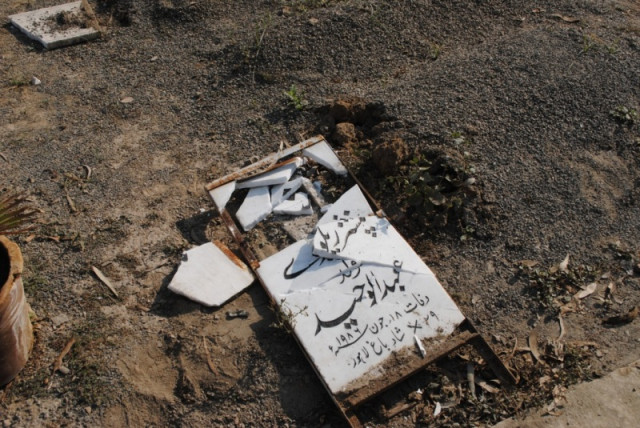Silence resonates after Ahmadi graves’ vandalised
Community members decry authorities’ apathy towards attack.

Walls of the recently desecrated Model Town Ahmadi graveyard stand high, while an armed guard patrols the gate. On the very same road stands a Muslim graveyard with an open gate, low boundary walls and no armed guard on duty.
The beefed up security follows in the wake of fifteen masked men’s attack on the Ahmadi cemetery on December 3, when they razed tombstones of over a hundred graves.
Those whose loved ones were buried there are bewildered. The desecration of his mother’s grave has shaken Abid*. Her tombstone lay completely demolished. Abid’s question, “How can anyone even think that shattering a tombstone with Kalima engraved on it, is a service to Islam?” has been met with silence by the authorities.
Cycle of hatred
This is not the first time the Ahmadi community in Pakistan has been left with a sense of alienation. Nawaz Hashmi* has paid a price for his faith for three consecutive years: in 2010, he survived an attack at an Ahmadi place of worship in Lahore. In 2011, Hashmi, along with six other men, lost his job because he was an Ahmadi. And in 2012, his late father’s grave in the Model Town graveyard was razed.
“We are conditioned to live in fear,” says Hashmi. His sick mother had shed many tears after her husband’s last remains were violated.

“The chief justice is seen to take suo motu notices of the most trivial issues, then why the silence on the desecration of our graves?” asked Imran Ali*, whose father’s grave was also demolished. “Even our neighbours did not hear of the assault owing to lack of coverage by the media.”
The authorities’ cold shoulder was a haunting déjà vu: no senior politician or government official had turned up at the site of the 2010 attack on an Ahmadi place of worship in Lahore.
On the contrary, the Punjab police itself removed Quranic texts from an Ahmadi graveyard in Faislabad, which they said was to avert clashes in the face of threats from extremist organisations.
The Ahmadi community administration in Lahore says that the absence of a violent reaction from its side should not be taken as a sign of defeat. The DIG Investigation of Lahore, Shafiq Gujjar, assures that the desecration of graves is a high priority case for them.
History of hatred
Shahid Ataullah, a senior administrator of the community in Lahore, says that violation of the rights of the community in urban Punjab could be traced back to 1974. Narrating an incident, Ataullah says, “In 1974, the then chief minister of Punjab Muhammad Hanif Ramay, called the head of Ahmadi community in Lahore and asked him to tell the community to not retaliate in the face of any violent attacks.”
No hope against hatred
The Human Rights Commission of Pakistan (HRCP) condemned the incident of Lahore grave desecration, as did other human rights bodies. IA Rehman, Secretary General of HRCP, added to the commission’s official condemnation by saying that widespread incidents of intolerance towards religious minorities and different sects of Islam suggest that Pakistan does not do justice to its membership of the Human Rights Council.
*Names have been changed to protect identities
Published in The Express Tribune, December 10th, 2012.



















COMMENTS
Comments are moderated and generally will be posted if they are on-topic and not abusive.
For more information, please see our Comments FAQ